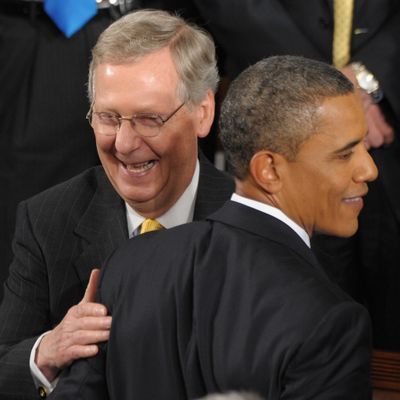
President Obama, speaking in the wake of a horrendous jobs report on Friday, made an interestingly hopeful prediction about a prospective (and now, somewhat less likely) second term. Obama predicted that his winning would prod Republicans in Congress to stop being so crazy and start cutting deals:
“It will be coming to a head in this election. We’re going to have as stark a contrast as we’ve seen in a very long time between the two candidates. 2008 was a significant election, obviously. But John McCain believed in climate change. John believed in campaign finance reform. He believed in immigration reform. There were some areas where you saw some overlap.”
“In this election, the Republican Party has moved in a fundamentally different direction. The center of gravity for their party has shifted.”…
“I believe that if we’re successful in this election, when we’re successful in this election, that the fever may break, because there’s a tradition in the Republican Party of more common sense than that. My hope, my expectation, is that after the election, now that it turns out that the goal of beating Obama doesn’t make much sense because I’m not running again, that we can start getting some cooperation again.”
This is the kind of thing an incumbent needs to say in order to avoid a conceptual trap. In order to get a second term, he needs to promise some kind of positive agenda. But such an agenda leaves him open to questions about why he didn’t accomplish it in his first term. Obama is offering a simple answer: He’ll get it done because, as a lame duck, Republicans will no longer be obsessed with defeating him.
But is it true?
What Obama called the Republican “fever” is the confluence of several trends. The GOP has been trending steadily rightward for more than thirty years, and the trend has sharply accelerated since Obama took office. Policies like campaign finance reform, cap and trade, Romneycare, fiscal stimulus, and many others once embraced by mainstream Republicans have become anathema.
And, as Obama notes, a layer of raw partisan calculation on top of genuine ideological fanaticism has made Republicans even more reluctant to compromise. As Mitch McConnell oddly admitted, the party’s top priority was to defeat Obama. Republicans understood that striking bargains with Obama would make him more popular, help him position himself in the center, and — in the case of economic stimulus legislation — boost economic growth and further augment his standing. Republicans further understood that Obama’s political appeal was rooted in his trans-partisanship, so withholding all partisan cooperation would by definition make him a failure. On top of that, all these factors created a feedback loop, with Obama’s lack of bipartisan support making him more polarizing and thus making it even harder for Republicans to risk cutting deals with him.
Unfortunately for our imaginary second-term Obama, the most important dynamic driving the radicalization of the party has nothing to do with electoral calculation. Republicans in Congress now exist in a state of almost continuous alarm over the prospects of a right-wing ideological challenge. Even small acts of bipartisanship, like Dick Lugar’s cooperation with Obama on nuclear nonproliferation or Charlie Crist’s notorious hug, can be potential career-enders.
Now, if Democrats win back the House of Representatives, or even come close, that might provide the shock to the system required to get Republicans to rethink their approach. It would, at minimum, balance out the alignment of threats, creating among at least some House Republicans a fear of being punished by the general electorate for being too crazy, and not just of being punished by primary voters for not being crazy enough.
It’s true that, if Obama wins reelection, the GOP’s incentive to defeat him by withholding cooperation will diminish. But it won’t disappear. There will still be elections in 2014 and 2016, and Republicans will still tend to do better in those if Obama is less popular. The GOP under Obama is the first American opposition party to fully grasp its incentives and act on them. Obama may be able to force Republicans to cut a deal because he leaves them no alternative, but they’re not going to willingly surrender what has been a highly successful strategy.






























